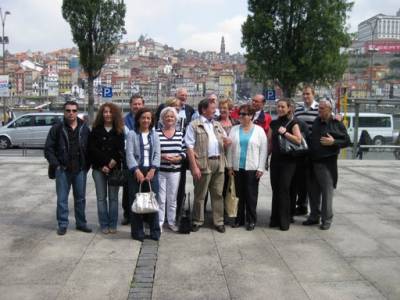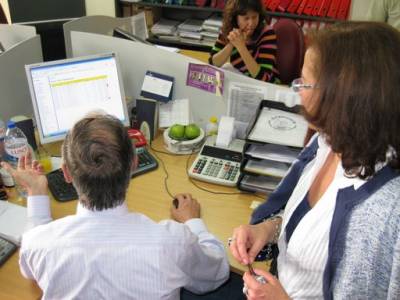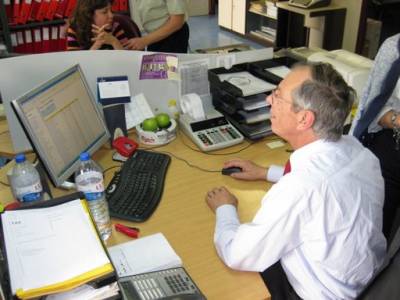New faces for OCEAN's Leadership in 2019
They sit down for a tell all interview on a broad range of ship supply matters
In 2019, the leadership team of OCEAN was renewed. First, S. Moloney took over as Administrative Secretary General working from the UK. Next, K. Maier became new Secretary General for the Brussels office. In November, the new Chair W. Sump and Vice-Chair D. Cupido were elected. Time to sit down with all four and have a chat.
OCEAN: Mr Moloney, let’s start with you. Who are you?
S. Moloney: I have taken on the role of Secretary General of ISSA – the international association representing nearly 2,000 ship suppliers throughout the world. This also comes with the responsibility of looking after the administrative side of OCEAN, as OCEAN is a committee of ISSA and we work closely together. I have been involved in ship supply and maritime trade for decades, running the ISSA magazine “The Ship Supplier”. I am excited to collaborate with the Brussels Secretariat. We share the view that maritime trade is essential for the world, not only for Europe. And without ship chandling, maritime trade, as we know it today, would not be possible.
OCEAN: Mr Maier, you joined us mid-year. Tell us a little about you.
K. Maier: “I graduated from the University of Hohenheim, Institute for Farm Management, specialised in agronomy and economics and then worked in professional associations for the food industry and agriculture for nearly 25 years. It is with great pleasure that I took over as Secretary General of OCEAN. Even in my short time here, I have noticed, in talking with colleagues and EU Commission officials, that OCEAN has been represented in Brussels as a leading European organisation, representing the interests of the ship supply community of Europe vis-à-vis the European Institutions for many years across very diverse subject, from customs to veterinary, excise and VAT affairs. You can count on me to build on this success. As it’s not just me being new, it’s a chance to reflect and build up further alliances as the new Commission has started already at the beginning of December and the new Parliament almost half a year ago.
So, besides the new possibilities, I am glad having continuity with the team like Arne Mielken and the board and working group, whom I already met at the last meetings in Brussels.
And it was a pleasure having had, after these first direct contacts, the Greece representative Mr Navrikos at the General Assembly of the Livestock and Meat Trades Union in Athens beginning of November.”
D. Cupido: Dr Maier has an excellent track record of leadership and engagement across the agribusiness sector, which he can put to good use for the ship supply industry. We are confident in his ability to build with OCEAN members, EU Institutions and stakeholders new perspectives to address the challenges faced by the ship supply sector in Europe, such as ship-owner’s and captain’s expectations to speedily deliver high quality products at competitive prices, 24-7 and 365 days a year to any incoming vessels in any port of the European Union. Our trade is unique, and we believe Dr Maier and Mr Moloney are the right persons to carry this message to the EU decision-makers.”
OCEAN: Mr Sump, you have worked with ship suppliers for all your professional life. As new OCEAN Chair, tell us, why does ship supply still matter today in the EU?
W. Sump: Please allow me to quote the former EU Commissioner Dr Joe Borg, who noted at an ISSA convention in Malta in 2007 that “Ship suppliers play an essential role [for maintaining maritime trade and shipping] enabling the whole system to work smoothly. Without them, the complex world of maritime logistics could not work, as they enable ships, of all sizes and characteristics, with very different schedules and requirements, to be ready for non-stop operation in all our ports”. You see, it requires unique craftsmanship to be able to supply the needs of the commercial vessel, including its crew and passengers during the time spent at sea or in port, sometimes to very ship-specific requirements or national tastes of the crew at any time of day or night. It is, therefore, to no surprise that European ship suppliers need to stock a large variety of technical and non-technical items in their warehouses and regularly re-stock and move them around Europe to wherever the vessel calls.
OCEAN: S. Moloney, how is ship supply different from other businesses?
S. Moloney: You see, ship supply is a unique “just-in-time” business, which encompasses many different transport modes in many different countries under particular time and financial constraints. Global services, economies of scale, efficient logistics systems and operations, prompt local service and unrivalled attention to customer needs are all critical elements in the supply of parts and provisions to ships. As Chair Sump said, and this goes for ship supply globally, we supply 365 days – 24 hours a day - service at any time – day or night and we deliver small amounts of multiple items – mixed consignments and these come tax and duty-free.
OCEAN: Mr Cupido, as former OCEAN Chair and involved in Dutch ship supply all your life, what’s your take on why European ship supply matters in 2020?
D. Cupido: European ship chandlers supply vessels worldwide. Whatever the vessel or its crew may need, it can be found in the vast assortment of the European chandler. An EU ship supplier is required to deal with numerous different commodities to meet all possible requirements. We are talking about food & drink, tobacco products, electro-technical products, machine, cabin, deck and engine stores and many more. This can include, for example, critical safety and lifesaving equipment or nautical cards, books, software, publications, and modern stationery. The challenge in Europe is to try to access ports which are in any of the EU Member States. Despite harmonised EU customs and veterinary laws, there are many legislative discrepancies when it comes to ship supply, and without a level playing field and harmonised rules and regulations, we may face administrative burden and costs that others do not. We need to address this and are doing this successfully in OCEAN.
OCEAN: Mr Maier, how does OCEAN represent the interests of its members, the national ship supply organisations of Europe?
K. Maier: As Secretary General, I have the pleasure and honour to head the Brussels office of OCEAN. We pro-actively represent the interests of the Organization towards the EU Institutions. We do this by attending EU Institution meetings and report back to the OCEAN leadership, by monitoring, tracking and reporting on EU legislation, initiatives, recommendations, by contributing to the OCEAN Board meetings and by supporting the OCEAN Administrative Secretariat in the UK, our second “office.” The Secretariat in Brussels also supports the running of two working groups, veterinary and customs and taxation, where we follow initiatives at the EU level. Some of the laws & policies we follow include the Official Controls Regulation (EU) 2017/625, Article 269 2 c of the Union Customs Code (UCC), UCC guidelines for ship supplies – harmonised treatment across the EU, VAT & excise, Brexit – of course, Tobacco – the tracking and tracing law and maritime transport and affairs. Besides activity for trade with GATT/WTO, we are also responsible for Transport and Logistics working together with the German Industry Association BDI. You see, we are very active, and this is great!
OCEAN: Mr Cupido, what are some of the challenges that EU ship suppliers face?
D. Cupido: At the forefront of all efforts for OCEAN stands the need to provide pragmatic, realistic and workable solutions that allow for Europe to move forward while ensuring the competitiveness of the EU ship supply industry. Harmonised EU customs, excise, vat, tobacco and veterinary law for ship supply are essential. Given the (logistical) challenges the EU ship supply industry faces daily, we must ensure that our sector is taking into account considerably at the level of national and European governmental institutions. This will be especially important with the new European Parliament and the new European Commission, but also steadily continuing and deepening the long lasting contacts with the Commission services.
OCEAN: The Chair shall have the final word…
W. Sump: I am proud of our European ship supply industry, contributing to jobs and growth in Europe. A specialised industry, which answers to particular challenges faced by vessels when calling EU ports. Being ready – 24 h / 7 days a week, is a must, and European legislation would need to support such an operation. OCEAN Secretariats, the members under my leadership, stand ready to take OCEAN into the third decade of the 21st century. Available – set – go!
OCEAN: Gentlemen, thank you for your time.




